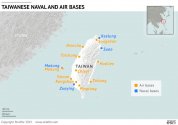China continues to develop for 25-30 years, it’s standard of living, it’s governance and people happiness and life satisfaction should all be better than Taiwans by then. China just keeps things stable, continue doings it job well, continues to make breakthroughs of all kinds, while the US continues it’s losing and selfish strategies and the population will come to realize that reunification will be much better than the status quo and will move for it.
All China has to do is continue what it is continually improving at, which is making friends and influencing people.
I’d like to see China focusing on a war against western media, capital and politicians, using science and technology to expose the tactics they use to unduly influence people and show their corruption for all to see. Kind of like the Facebook whistleblower. If China can win the battle for people hearts and minds, and they should because they are the good guys here, then war can be avoided, Taiwan reunites peacefully and we move fully into the new era.
This is what I think Chinese victory looks like, win without fighting.
That should be the plan yes. A high-income China should drag up incomes in much of the developing world, and also vastly increase the trading opportunities available globally.
---
And a military perspective, China's military capacity keeps rising.
Some people (Erickson, Adm Davidson) think China will end up peaking in the next decade, and that China needs to act now before it is too late.
But if we look at the Chinese "stock" of advanced weapons, I get a figure of a 50% increase in the next 6 years from 2021-2027.
Using that projected 2027 figure as a baseline, I get another increase of 47% in the following 6 years.
China's stock of advanced weapons (and capabilities) would roughly double in the space of 10 years, and still continue to grow fast afterwards.
So there isn't actually any rush to act now.
If the status quo was to remain for another 10+ years, I think that would be fine. Wars come with all sorts of risks and costs.
NB. Assumptions include an average 30 year weapons lifespan, China continues at 1.7% of GDP in military spending, and only 4% GDP growth per year

